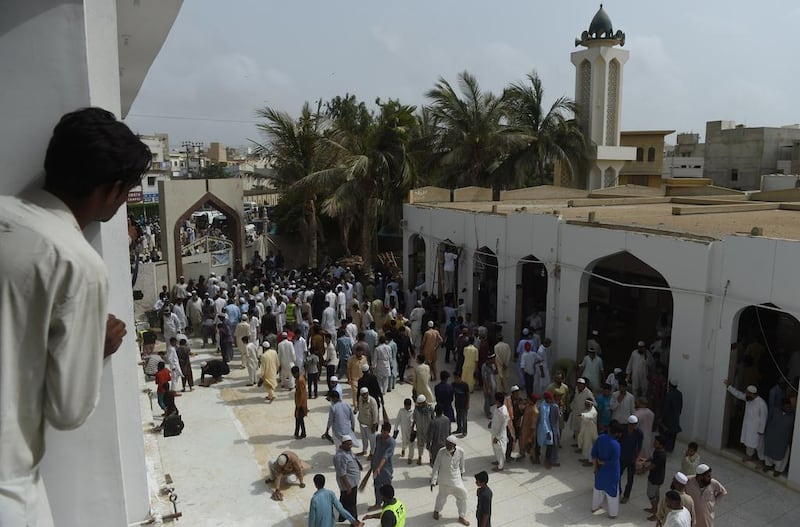In a 2011 essay about the state of his native country, Mohsin Hamid declared that “Pakistan is, quite simply, a land that mistreats its minorities and its majority”. Six years on and fellow Pakistan-born writer Nadeem Aslam shows in his fifth novel that Hamid’s description is still sadly valid.
The Golden Legend, Aslam's first novel since his debut Season of the Rainbirds (1993) to be set solely in Pakistan, is a tense and topical story of persecution and resilience, one that compellingly portrays a country in chaos and individual lives clinging together in freefall.
Married couple Massud and Nargis are successful architects who live well in the city of Zamana. Next door to them are two Christians, their former housekeeper Lily and his 19-year-old daughter Helen. Massud and Nargis have been more than generous to them, providing Lily with a rickshaw to forge a new livelihood and paying for Helen’s education to prevent her from ending up an illiterate drudge in a Muslim household.
One day they are rocked by the news that the man who murdered Helen’s mother three years ago has been released early from prison. Injustice gives way to disaster when a public shootout shatters the fragile peace in the community. Massud dies in the crossfire. Nargis is browbeaten – then beaten – by a military intelligence “soldier-spy” who, for the sake of political expedience, demands that she pardon in court her husband’s American killer.
Despite standing her ground, Nargis fears she is no position to barter, for she has a secret, one she never even divulged to Massud. She isn’t the only one in Zamana with something to hide. Lily has been enjoying clandestine liaisons with new lover Aysha, a “holy martyr’s widow”, and the exposure could cost him his life.
Aslam has an ingenious means of implementing that exposure. Someone has been entering the city’s mosques at night and inciting violence by using the minarets’ loudspeakers to declaim various citizens’ “immoral acts and corruptions”.
When Lily’s romance is broadcast he is forced to flee. Helen is tainted and also charged with blasphemy and takes off in a different direction with Nargis and their new friend, or possible foe, Imran.
Aslam’s characters become fugitives but his novel is no high-octane cat-and-mouse adventure – rather a thoughtful and frequently powerful drama that probes human relations and explores the cost of defiance and extent of forgiveness.
In Aslam’s main strand, his trio takes refuge on an island, in a mosque designed by Nargis and Massud, and, after swapping tales and earning trust, Helen and Imran discover that love is the best antidote to the violence around them.
And what violence. After the catalytic deaths of Helen’s mother and Nargis’s husband, the body count escalates. Militants massacre the “infidel” staff of a liberal current affairs magazine while suicide bombers run amok in a mausoleum. Lily plots to avenge his wife’s murder, Imran recounts the horrors he witnessed growing up in Kashmir and Nargis relates how her journalist brother-in-law was tortured to death for getting too close to the truth.
As with Aslam's previous novel, The Blind Man's Garden (2013), in and around the scenes of intimidation and intolerance and the bouts of seething, roiling brutality, are flashes or huge stretches of great beauty. Moths flutter in a mosque "like trapped prayers".
Helen is rendered speechless by her mother’s death: “It was as though her pen ran out of ink while writing a letter.”
There are beautiful buildings and one beautiful, indestructible novel. However, its real beauty lies in the grace that radiates from the characters – beleaguered but unbroken and unwilling to give up on humanity.
Aslam’s narrative is bookended by two small yet recurring problems. His last novel got off to a false start by opening with a single, standalone portentous sentence: “History is the third parent.” Here he hits us with something equally gnomic: “This world is the last thing God will ever tell us.” At the other end, and as before, Aslam has trouble maintaining momentum. Later sections sag, or, in the case of Lily’s hazardous flit through sewers, are over far too soon.
The rest – that is, the bulk – of The Golden Legend is nothing less than a triumph. Wise and affecting, this is a timely and necessary novel that artfully underscores the dangers of division and the sanctity of hope.
Malcolm Forbes is a freelance writer based in Edinburgh.










